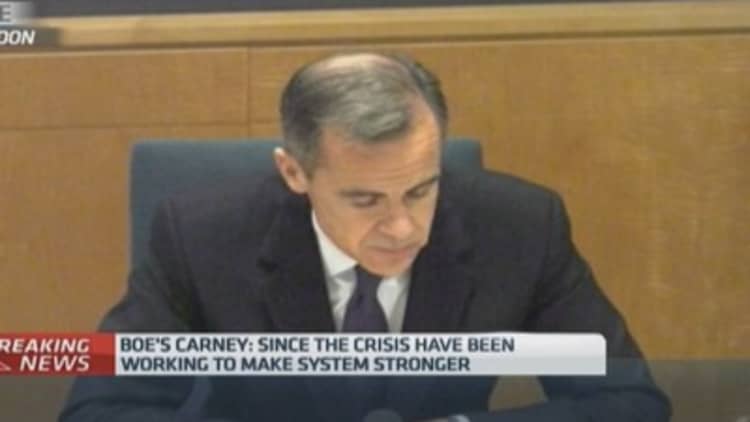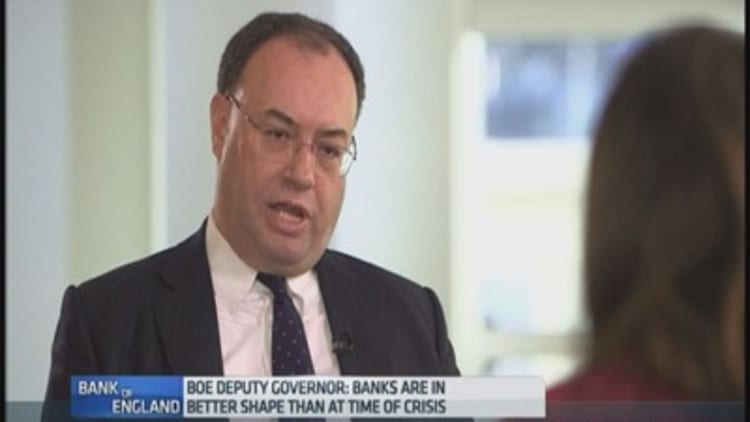


The Co-operative Bank has failed a key test of how it would perform in a financial crisis by the Bank of England, and Royal Bank of Scotland (RBS) and Lloyds Banking Group were warned that their capital position at the end of 2013 was inadequate.
The tests by the Bank of England were in order to work out whether banks had enough capital to survive, for example, a 35 percent plunge in house prices.
Other worst-case scenarios tested included interest rates rising from 0.5 percent to above 4 percent, unemployment nearly doubling to 12 percent, and a 30 percent drop in the value of sterling against a basket of other currencies.
RBS's "minimum stressed ratio" - the key threshold of whether it has enough capital to survive the theoretical stresses - before planned management actions was 4.6 percent, just above the 4.5 percent the Bank of England was looking for. Lloyds came in at 5 percent, while Co-op fell far below the threshold at -2.6 percent.
Barclays, HSBC, Nationwide, Santander UK and Standard Chartered all passed the stress tests comfortably.
Andrew Bailey, the Bank of England's deputy governor for prudential regulation, described the results as "encouraging".
"Six year after the real depth of the financial crisis in 2008, the U.K. banking system is in better shape. It's safer and sounder," he told CNBC on Tuesday.
"Capital levels are higher and it's more able to resist the severe shock we subjected it to, and that of course allows it to support the economy."
RBS and Lloyds were told that they needed to strengthen their capital position as of the end of 2013, but the Bank of England added that their situation since then has improved. As such, only Co-op has to submit a revised capital plan.
Bailey stressed it was important to note that the banks were on "recovery paths".
"Our judgment against a severe stress – which is not what we expect to happen, but is what we're trying to protect the system against – is that they have some further work to do," he added.
'Real change' in housing
U.K. banks' over-reliance on the housing market was also highlighted, just as house price growth in the country appears to have peaked.
Bailey noted that, with regards to housing, there had been a "real change since the summer".
"The real risks that we were pointing to in terms of the growth and level of household indebtedness have not materialized in the way we were concerned about," he said. "So that's helpful."
The Bank of England also warned about the danger of falling oil prices reinforcing "certain geopolitical risks."
Inconsistencies?
Concerns have already been raised about the validity of the exercise.
"Any calculation by regulators, investors or auditors of a bank's health can be undermined because it hinges on the lender's own valuation of its assets which evidence shows can be inconsistent," David Tweedie, chair of the International Valuation Standards Council, told CNBC.
"The absence of a common approach means if financial institutions making aggressive valuations were to use the methodology and assumptions used by more conservative institutions these differences could drastically reduce the aggressive institution's equity. Therefore how accurate and comparable are the banks' current income statements, balance sheets and the Basel capital adequacy buffers? This needs to be resolved urgently if we are not to sleepwalk into another financial crisis."
John McFall, former chairman of the House of Commons Treasury Select Committee, told CNBC that, for the banks to restore trust among the broader population, they needed to reconnect with the community.
"A generation ago banks were embedded within our communities. Now there is just a call center mentality with their customers," he told CNBC.
"Banks have to decide whether they should serve the wider community and have a social obligation. At the moment, that is a pipe dream."
Co-op Bank had been expected to fail the tests. The bank, once part of the Co-Operative movement, was taken over by private equity companies last year after a series of embarrassing headlines about the state of its finances – and revelations about the drug habits of its former chairman Paul Flowers. It will now speed up its plans to sell off assets and strengthen its capital position.
Niall Booker, chief executive of the Co-op Bank, said: "Given we are in the early stage of our plan, the original capital deficit and the nature of our assets, it is no surprise that we have not met the severe stress test hurdle today.
"Our revised plan, accepted by the regulator, will see us accelerate our strategy to significantly reduce risk weighted assets."
Dividend under threat
Taxpayer-backed Lloyds' plans to pay a dividend next year now also look under threat. Together with RBS, it will have to get permission from the Bank of England to resume payouts to shareholders.
António Horta-Osório, chief executive of Lloyds, said: "The stress test was based on our balance sheet as at the end of 2013 and since then we have made further significant progress in strengthening our capital position and delivering on our strategy."
RBS announced the £1.1 billion ($1.72 billion) sale of a portfolio of Irish real estate loans to U.S. private equity group Cerberus, as reported by CNBC in September.
McFall added that the government and politicians should "take note of the results and be very relaxed when it comes to disposing of it ownership."

In October, 24 European banks, none from the U.K., failed European Banking Authority "stress tests" of their finances.
The U.K. held separate, more stringent tests, to look at the particular risks associated with the U.K. The European tests only looked at systematically important banks, which in the U.K. meant its four biggest banks. However, RBS only narrowly scraped through, and admitted in November it had overstated how much it had passed the tests by.
- By CNBC's Catherine Boyle





